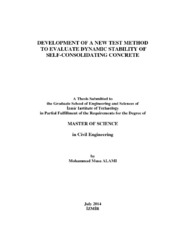Please use this identifier to cite or link to this item:
https://hdl.handle.net/11147/4222Full metadata record
| DC Field | Value | Language |
|---|---|---|
| dc.contributor.advisor | Erdem, Tahir Kemal | - |
| dc.contributor.author | Alami, Mohammad Musa | - |
| dc.date.accessioned | 2014-12-03T09:36:58Z | - |
| dc.date.available | 2014-12-03T09:36:58Z | - |
| dc.date.issued | 2014-07 | - |
| dc.identifier.uri | http://hdl.handle.net/11147/4222 | - |
| dc.description | Thesis (Master)--Izmir Institute of Technology, Civil Engineering, Izmir, 2014 | en_US |
| dc.description | Includes bibliographical references (leaves: 93-98) | en_US |
| dc.description | Text in English; Abstract: Turkish an English | en_US |
| dc.description | Full text release delayed at author's request until 2015.07.14 | en |
| dc.description.abstract | Self-consolidating concrete (SCC) is a new generation of concrete with high performance. It is able to flow under its own weight and fills the formwork without any external vibration. Stability is the most important plastic and crucial property for successful application of SCC and it refers to segregation of constituent in fresh state. Dynamic stability is the segregation resistance of SCC during transportation and placement. Evaluation of dynamic stability is one of the most investigated topics of SCC. Many different test methods have been proposed to evaluate the dynamic stability of SCC. No single and widely accepted method exists for the evaluation of the dynamic stability of SCC. In this thesis a new apparatus for testing the dynamic stability of SCC was developed. The effect of different mix design parameters such as water-to-cement ratio w/c, slump flow diameter, coarse aggregate-to-total aggregate ratio (CA/TA), and maximum size of aggregate (Dmax) were evaluated on the dynamic stability of SCC. Several fresh concrete tests were carried out on the SCC mixtures: slump flow, T500 time, Visual stability index (VSI), V-funnel, L-box, static sieve segregation (GTM), rheometer, and new proposed method (DSST). Several correlations were established between the test results. It was found that the new proposed test is a suitable method to evaluate the dynamic stability of SCC. Limits were proposed for a dynamically stable SCC. | en_US |
| dc.language.iso | en | en_US |
| dc.publisher | Izmir Institute of Technology | en_US |
| dc.rights | info:eu-repo/semantics/openAccess | en_US |
| dc.subject | Self-consolidating concrete | en_US |
| dc.subject | Dynamic stability | en_US |
| dc.subject.lcsh | Concrete--Testing | en_US |
| dc.title | Develepment of a new test method to evaluate dynamic stability of self-consolidating concrete | en_US |
| dc.title.alternative | Kendiliğinden yerleşen betonun dinamik kararlılığını değerlendirmek için yeni bir test metodu geliştirilmesi | en_US |
| dc.type | Master Thesis | en_US |
| dc.institutionauthor | Alami, Mohammad Musa | - |
| dc.department | Thesis (Master)--İzmir Institute of Technology, Civil Engineering | en_US |
| dc.relation.publicationcategory | Tez | en_US |
| item.openairecristype | http://purl.org/coar/resource_type/c_18cf | - |
| item.cerifentitytype | Publications | - |
| item.fulltext | With Fulltext | - |
| item.languageiso639-1 | en | - |
| item.grantfulltext | open | - |
| item.openairetype | Master Thesis | - |
| Appears in Collections: | Master Degree / Yüksek Lisans Tezleri | |
Files in This Item:
| File | Description | Size | Format | |
|---|---|---|---|---|
| 10043551.pdf | MasterThesis | 3.29 MB | Adobe PDF |  View/Open |
CORE Recommender
Page view(s)
104
checked on Apr 15, 2024
Download(s)
90
checked on Apr 15, 2024
Google ScholarTM
Check
Items in GCRIS Repository are protected by copyright, with all rights reserved, unless otherwise indicated.